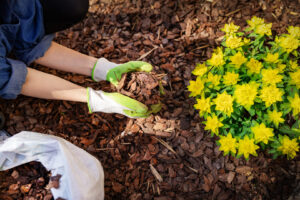
Before getting your hands dirty, you should know when to mulch your garden so your flowers can thrive.
Timing is everything when caring for your garden—a sentiment that’s especially true for mulching. Mulching involves spreading organic matter over the soil to protect it from weeds, improve moisture retention, prevent soil erosion, and insulate plants. But adding mulch to your garden at the wrong time, either too early or too late, can have unexpected consequences.
Before getting your hands dirty, make sure you know the right time to mulch your garden so your flowers can thrive.
Why is Mulch Important?
A fresh layer of mulch helps your soil retain moisture, so you won’t have to water as much. Moist roots are happy roots, and happy roots mean beautiful flowers. Mulch also suppresses weed growth, which is good for aesthetic appeal and prevents the weeds from sapping up moisture. Although some weeds can survive on top of the mulch, the roots can’t secure themselves and can be easily uprooted. As time passes, your organic mulch will settle and look thin. That means it breaks down, enriches your soil, and makes it more fertile.
When to Mulch
Spring is the ideal time to add and replace mulch in your garden. The balance between old and new growths is at its peak in spring, and mulch’s protective and nutrient-rich properties can ready the road toward a thriving summer for your garden. In early spring, the weeds haven’t sprouted yet, herbaceous plants are starting to grow, and the soil is warming up, which means it’s the perfect time to lay your mulch while avoiding other plants’ lifecycles.
Consider Your Soil’s pH Level
Some mulches have a high or low pH balance, which can have a noticeable effect on plant health. For example, organic mulches have a naturally low pH, but the soil will neutralize as they decompose. Some plants prefer the high end of the scale and the low end, and the soil must be treated to accommodate that.
How Much Mulch Do I Need?
As great as mulch is for your garden, there’s such a thing as too much. Applying a thick layer of mulch can likely encourage fungal disease and possibly kill your plants. But, if you don’t add enough, weeds will push through the soil and hinder plant growth. Two to three inches of mulch works well for most flower beds.
Questions? Lehnhoff’s Supply is Here to Help
If you still have more questions about when you should mulch your garden, the trained professionals at Lehnhoff’s Supply are here to help you.
Find us at 2708 Belair Road, Fallston, MD 21047 and give us a call at 410-510-7646. For tips, tricks, and to see what we have been up to, be sure to follow us on Facebook, X – Twitter, and Pinterest!
We serve but aren’t limited to, the following parts of Maryland: Harford County – Fallston, Forest Hill, Joppa, Edgewood, Bel Air, Churchville, Havre de Grace, Jarrettsville, Street, Aberdeen, Abingdon, and Joppatowne. In Baltimore County: Kingsville, Perry Hall, Overlea, Fullerton, Nottingham, Parkville, Towson, Carney, Loch Raven, Lutherville, Timonium, Hunt Valley, Cockeysville, Sparks, Glyndon, Pikesville, Reisterstown, Ruxton, Parkton, Glen Arm, Baldwin, Monkton, Long Green, White Marsh, Rosedale, Phoenix, and Fork.
